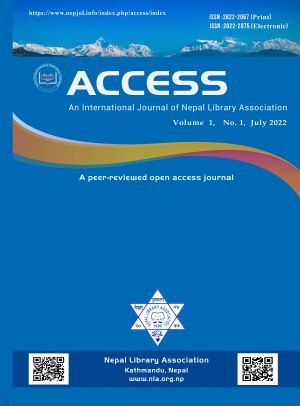Appropriate Frameworks for Understanding Educational Change and Culture to Use in Socio-Technological Innovation Studies in the Field of Information Management in Sri Lanka: A review of literature
DOI:
https://doi.org/10.3126/access.v1i1.46607Keywords:
Educational Change, Culture, Socio-Technological Innovation, Information Management, Sri LankaAbstract
Information is considered a fundamental resource for improving the quality of governance and promoting socio-economic development in developing countries. In Sri Lanka, under the government’s vision of higher education, Information Management (IM) education is seen as important for fostering the development of a high quality market-oriented and knowledge-based society. However, a number of barriers currently restrict access to IM education by Sri Lankan information workers: the provision of education is limited to face-to-face teaching at three institutions in the Colombo (capital city) area, and the country’s physical infrastructure makes it difficult for full-time workers to attend classes without missing substantial work time. This results in IM employer reluctance to support education. Hence there is a growing need to provide equity of access to IM education. In response to World Bank reports (2007, 2009) the Quality Assurance and Accreditation Council (QAAC) of Sri Lanka aims to foster transformative change in IM education with the goal of increasing equality of access to IM education through the use of e-learning. A number of early attempts to implement e-learning in Sri Lanka have already failed (Anderson, 2008). There is no rigorous research that investigates what factors have an impact on the introduction and use of e-learning in tertiary-level IM education in the Sri Lankan context and what the barriers or enablers to doing so might be. Understanding of the cultural context is known to be critical for the success of e-learning.
Major research project has been carried out to fill these gaps in the literature. It was guided by two research questions: (i) what are the contextual factors that affect the introduction and use of e-learning in tertiary-level IM education in Sri Lanka? and (ii) how do these factors affect the introduction and use of e-learning? An interpretive case study research was conducted. Thirty semi-structured interviews were conducted with information management education providers, existing e-learning providers and relevant stakeholders, and three focus group discussions were conducted with information workers and academics. Relevant documents were also analyzed.
This paper presents how appropriate frameworks have been selected for understanding said educational change and culture to use in socio-technological innovation studies in the Field of Information Management in Sri Lanka by reviewing extensive literature. Accordingly, Fullan’s (1991) educational change theory and Hofstede, Hofstede, and Minkov’s (2010) cultural dimensions provided a basis for a conceptual model to guide the process of data collection and analysis in this study to gain an understanding of factors affecting the introduction and use of e-learning in tertiary-level IM education in Sri Lanka.
Downloads
Downloads
Published
How to Cite
Issue
Section
License
Copyright (c) 2022 Nepal Library Association

This work is licensed under a Creative Commons Attribution-NonCommercial 4.0 International License.




